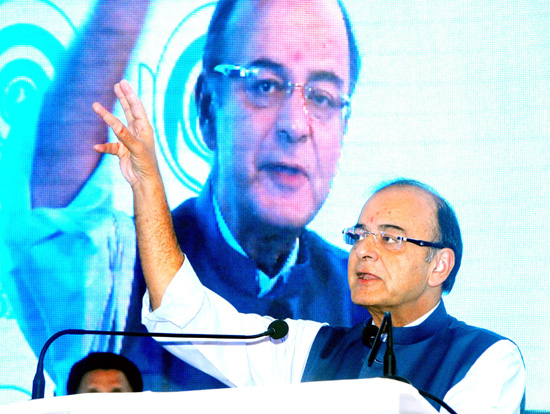
MUMBAI, July 12:
Government is working on a new agriculture insurance scheme to ensure farmers are not left at the mercy of rains, Finance Minister Arun Jaitley said today, even as he hoped “rain gods will be kinder this year” and help check the prices of pulses and other food products.
He also expressed confidence that the economy was moving on an accelerated growth trajectory, while higher tax revenues, improving macroeconomic fundamentals and ongoing reforms make 8-10 per cent growth “eminently achievable”.
Monsoon was above normal in June with 25 per cent excess rainfall despite a late arrival as well as a drought-like prediction and the rest of the monsoon may also be good, he said.
“It appears that the rain gods may be kinder this year to us. The farm department has informed me that with better rainfalls in most parts of the country, even for pulses, which at the moment are a cause of concern, productivity is likely to be much higher this year.
“I hope their estimates turn out to be true,” he said.
Speaking at the Nabard Foundation Day function here, Jaitley said the “silver lining” is that revenue collection situation is expected to be more comfortable than last year.
He said with the ongoing reform process, proposed GST, increased infrastructure investment and emphasis on smart cities, 8-10 per cent GDP growth is very much “in the sight”.
Allaying fears of any poor monsoon-driven troubles for the farmers and the consumers, Jaitley said the government has taken a number of initiatives, including the recently announced Rs 50,000 crore programme for a national irrigation.
Promising more sustainable measures for the farm sector so that the farmers are not left to the mercy of rain gods, Jaitley said “hopefully, in the near future, a viable and vibrant insurance scheme will be in place for farmers.
Jaitley said India needs higher growth as well as redistribution of resources.
“We need higher growth on one hand and we need to flag the concerns of the economy in those sections where the benefits of that growth process must reach first.”
The new agriculture insurance scheme will cover all the inputs put by a farmer into his farm as also the loans taken by him.
“Dr Ashok Gulati (Infosys Chair Professor for Agriculture at Icrier) just now made a very valuable presentation to the Finance Ministry where he came out with a doable and effective insurance programme, wherein the farmer is able to at least recover the basic inputs that he puts in, in the events of uncertainties created by more than one reasons,” Jaitley said. The present crop insurance schemes cover only the loans which a farmer has taken from banks. Noting that the agriculture sector presents its own set of challenges with successive low rate of growth over the years, he admitted, “We have been unable to ensure even a 4 per cent growth consistently in the field of agriculture.”
“With productivity levels reasonably low and 85 per cent farmers being small and marginal, the agriculture sector is afflicted by higher input costs, low level of irrigation, high indebtedness, absence of an effective insurance mechanism and adverse impacts of climate change,” he said.
The Met department has predicted a 13 per cent fall in monsoon this season. While the June rainfall was 25 per cent in excess of the average, July so far has been over 50 per cent deficient. Many international agencies have forecast a strong El Nino effect on the rainfall season in the year and even a possible drought.
“And I can tell you that this is only the beginning… I am full confident that with the economy likely to move up in the next few years, resources will be available…
“We are fairly clear about the fact that a large part of investment will have to go into agriculture, mitigating this rural distress and indebtedness of the farmer,” he said. Speaking at the same event, RBI Deputy Governor H R Khan also said the government is working on the new insurance schemes for farmers and RBI has also sent its comment on it. (PTI)

